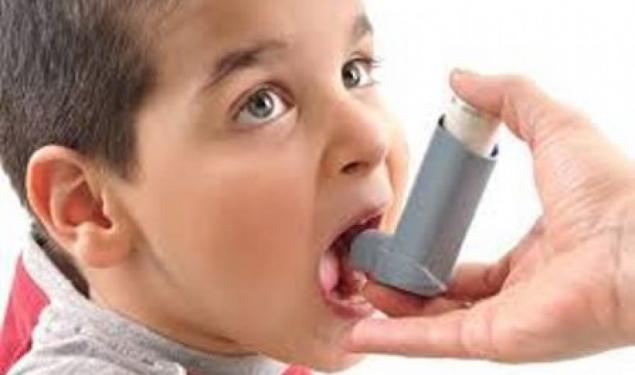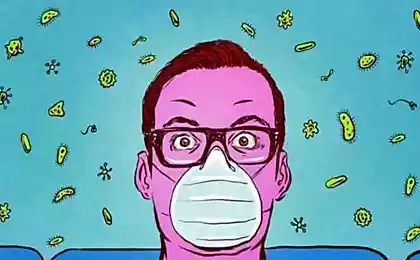402
Clean – the guarantee of the disease
Everything is good in moderation, including cleanliness in the house. American scientists came to the conclusion that if young children too protected from dirt and germs, in the future it could lead to allergies and asthma.
Parents instinctively protect the infants from any dangers, including germs. Although nature is not to outwit, and the process of birth and early feeding is arranged so that the necessary microflora will certainly fall into a child's body. And then begins the process of understanding the world and adapting to it, in particular due to microbes. Our obsession with cleanliness leads to that the person loses the natural protection of flora, who suffers from antibiotics, disinfectants and household chemicals, and as a result violated slim work immune system. This does not mean you have to stop to wash hands before eating, however, if you want to minimize the chances that your children became asthmatics and Allergy sufferers, it is not necessary to faint from the fact that the dog licked the sleeping baby. Perhaps in the future it will save him from nasty diseases.

Experts from the University of Massachusetts found that those whose childhood was spent in moderate conditions of poor sanitation, much less susceptible to allergies and asthma. Past studies have shown that among children who have grown up on farms, Allergy sufferers and asthmatics is much lower than among the indigenous inhabitants of the concrete jungle. Published recently in the journal "Allergy and Clinical Immunology is" the study of the specialists from the children's center of John Hopkins hospital show that if the child for the first time will face a strong allergen and a number of micro-organisms at an early age, the likelihood that it will become asthmatic and allergic, is greatly reduced.
"Our study suggests that important terms of first contact. This means that many immune response are formed in the first year of life, and also that many of the allergens and bacteria and stimulate and train the immune system," says the study's author, Dr. Robert wood. The experts observed 467 newborns from Baltimore, new York and St Louis for 3 years. Researchers examined children, parents, houses and their surroundings to identify various allergens and bacteria. The level of allergen-specific immunoglobulins in the milk, eggs, peanuts and red cockroaches, and after two or three years – on dust mites, cats, dogs, mice and fungal allergens were measured daily. It turned out that babies raised in homes where mice, cats and cockroaches, for three years they were healthier than their peers who are deprived of such contacts. Children who had contact with all three allergens were more resistant to allergies than those who got one or two. If we translate all the numbers, to three years 51% of children raised in clean, had problems with allergies, and among people who grew up with cats, cockroaches and mice this proportion was only 17%.
It is clear that the four - and six-legged inhabitants of the house is an additional source of bacteria. But, surprisingly, who grew up in homes with the highest bacterial background, proved to be the most healthy: only 8% suffered from asthma or allergies. Whereas in almost sterile homes with class of sufferers and asthmatics counted 41%.
According to statistics, about 5-7% of adults and 10% of the child population of Russia is suffering from asthma. In about half of cases of the disease first manifested to 10 years, and in the second half to 40. In families where the mother and father are healthy, the likelihood of developing asthma in a child is 20%, which is considered normal. When a family has adult asthmatics, this risk increases to 80%. If the conclusions of the American scientists are correct, this can be explained not only by heredity, but the fact that asthmatics minimize contact with animals and much more attention is paid to cleaning the house.
Source: nkj.ru
Parents instinctively protect the infants from any dangers, including germs. Although nature is not to outwit, and the process of birth and early feeding is arranged so that the necessary microflora will certainly fall into a child's body. And then begins the process of understanding the world and adapting to it, in particular due to microbes. Our obsession with cleanliness leads to that the person loses the natural protection of flora, who suffers from antibiotics, disinfectants and household chemicals, and as a result violated slim work immune system. This does not mean you have to stop to wash hands before eating, however, if you want to minimize the chances that your children became asthmatics and Allergy sufferers, it is not necessary to faint from the fact that the dog licked the sleeping baby. Perhaps in the future it will save him from nasty diseases.

Experts from the University of Massachusetts found that those whose childhood was spent in moderate conditions of poor sanitation, much less susceptible to allergies and asthma. Past studies have shown that among children who have grown up on farms, Allergy sufferers and asthmatics is much lower than among the indigenous inhabitants of the concrete jungle. Published recently in the journal "Allergy and Clinical Immunology is" the study of the specialists from the children's center of John Hopkins hospital show that if the child for the first time will face a strong allergen and a number of micro-organisms at an early age, the likelihood that it will become asthmatic and allergic, is greatly reduced.
"Our study suggests that important terms of first contact. This means that many immune response are formed in the first year of life, and also that many of the allergens and bacteria and stimulate and train the immune system," says the study's author, Dr. Robert wood. The experts observed 467 newborns from Baltimore, new York and St Louis for 3 years. Researchers examined children, parents, houses and their surroundings to identify various allergens and bacteria. The level of allergen-specific immunoglobulins in the milk, eggs, peanuts and red cockroaches, and after two or three years – on dust mites, cats, dogs, mice and fungal allergens were measured daily. It turned out that babies raised in homes where mice, cats and cockroaches, for three years they were healthier than their peers who are deprived of such contacts. Children who had contact with all three allergens were more resistant to allergies than those who got one or two. If we translate all the numbers, to three years 51% of children raised in clean, had problems with allergies, and among people who grew up with cats, cockroaches and mice this proportion was only 17%.
It is clear that the four - and six-legged inhabitants of the house is an additional source of bacteria. But, surprisingly, who grew up in homes with the highest bacterial background, proved to be the most healthy: only 8% suffered from asthma or allergies. Whereas in almost sterile homes with class of sufferers and asthmatics counted 41%.
According to statistics, about 5-7% of adults and 10% of the child population of Russia is suffering from asthma. In about half of cases of the disease first manifested to 10 years, and in the second half to 40. In families where the mother and father are healthy, the likelihood of developing asthma in a child is 20%, which is considered normal. When a family has adult asthmatics, this risk increases to 80%. If the conclusions of the American scientists are correct, this can be explained not only by heredity, but the fact that asthmatics minimize contact with animals and much more attention is paid to cleaning the house.
Source: nkj.ru
























